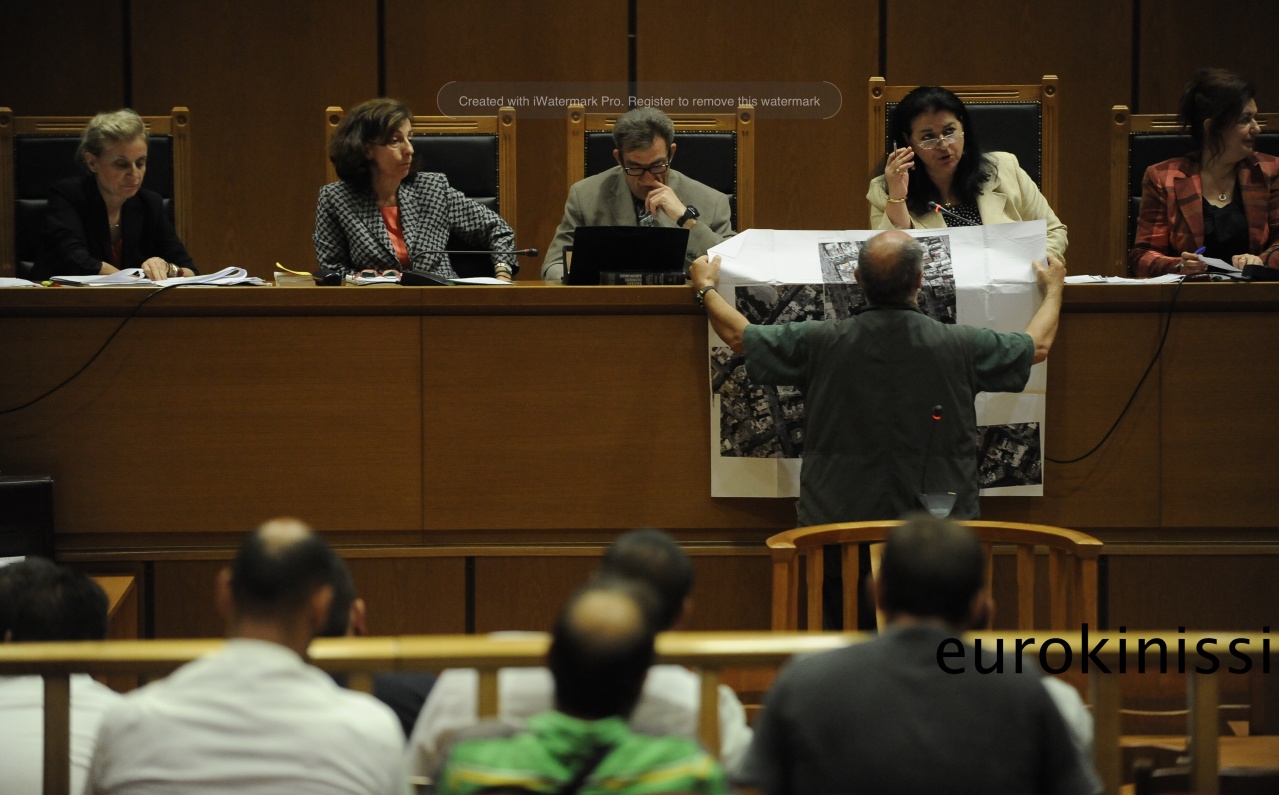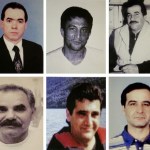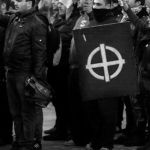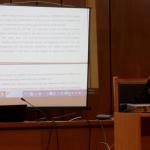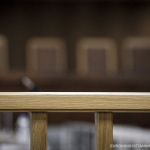72nd Hearing, Court of Appeals, July 8th, 2016
1. Access to the Court
The courtroom remains open to the public upon presentation of a state ID card, which is retained by court authorities for the duration of the session. Not many spectators were present at the start of the trial, but gradually the courtroom filled as the hearing progressed.
2. Presence and representation of the defendants
Present at the start of the proceedings were seventeen (17) defendants – all of them involved in the Fyssas case, except G. Dimou, who claimed illness during the last hearing. Twenty-five (25) defendants were recorded as absent, while the rest were represented by their counsels.
3. Proceedings – Examination of witness D. Chatzistamatis by the defense counsel (his testimony continues for the 3rd day)
Civil action counsel A. Tzelis (for the Fyssas family) reported that he had already motioned to call to the stand witness Nikolaou, and added Chandrinos, who has given his testimony to the investigative judge of the Court of Appeals. The state prosecutor reserved her judgment.
The defense counsel for Tsakanikas asked the witness about the total time that he was present at the scene of the attack, but also later during the murder and his transfer to the Keratsini Police Station. The witness stated that he did not remember exactly, since he was in shock and under pressure.
Responding to a question by defense counsel Bonis (for L. Tsalikis) concerning the witness’s movements on the night of the attack, as well as the two sides’ intentions, the witness stated that he first went to the Golden Dawn group and then to the Fyssas group. Each “group” waited for the other to depart, however the Fyssas group couldn’t leave, the witness said, because the other group had surrounded their cars. He also mentioned that the t-shirt of one of the persons in the other group was emblazoned with the words “Golden Dawn”.
Defense counsel Spyropoulos (for A. Tsorvas) told the witness that he has detected some differences between his initial “report”, that was compiled a short while after the incident, and his current testimony, and the answer was “the report was a summary, that’s what was asked of me, we’ve been through this”. At this point the witness added “and there’s one more thing that I haven’t mentioned because I didn’t think it was important, when the ambulance arrived I told the chief officer at the scene to conduct a search and record the cars from Kefallinias up to Xanthou and find sticks or clubs, if they exist. He told me ‘you have to get back to the police station because the identification is the most pressing matter”, and sent 2 motorbikes to conduct the aforementioned search. I heard later that the search was indeed conducted, but they found nothing”.
Responding to a question by the same defense counsel (Spyropoulos) concerning the things he read in the media about himself after the murder, the witness stated that following the incident he read on the internet that he “misguided the police” and that he set up Fyssas and his friends. He added that he never told Fyssas’ friends that he is a police officer.
Responding to questions by defense counsel Mammis (for N. Tsorvas) Chatzistamatis stated that he compiled his report while on duty with as much peace of mind as he could muster, and the witness also repeated that when he was asked to submit his report, they told him to write a summary of all that he saw.
The presiding judge read the report and said that she can’t find any omissions or differences and the defense counsel said “I’m sorry, you are correct”. The same defense counsel asked what is the difference between the shoes worn by Fyssas and those worn by the group that stamped their feet. The witness stated that the marching of the Golden Dawners was loud and that they surely had heavy shoes on, since sneakers don’t sound like that. As he testified, Golden Dawners were shouting “Come on you pussies, you assholes” and added that “this whole scene urges someone who is about to do something like this [:he means the murder]”.
Zografos (defense counsel for Gregos and Michos) insisted on questions about Fyssas’ shoes, if they were army boots or sneakers, to which the witness answered “they were high-top sneakers, those aren’t called army boots”. On the contrary the “opposite” group wore heavy shoes, definitely not sports shoes, the sound was too loud.
Papadellis (defense for Kasidiaris) posed a series of questions about the objective and the type of report the witness compiled shortly after the incident. For example, why did he name the case “the Fyssas Case” and not “Case X” and who was it that ordered him to compile the report. Also, why the date was handwritten on the report and where was it forwarded once it was completed.
The witness said that “you never learn these things”. The defense counsel then wondered about the witness’s position in an electronic registry, despite being trained in the handling of prisoners. The witness answered that “I work where they tell me, I don’t mind”.
The defense counsel then questioned the witness about his mental condition after the incident, adding the comment “what I’m interested in is that he knew everything, about the job, the family, and his life, wasn’t he under pressure? At the conclusion of his testimony to Klapa (the defense counsel reads the witness’s testimony where he mentions the wooden clubs).
Civil action counsel Th. Kabagiannis (for the Egyptian fishermen) objects, because the witness has mentioned the wooden clubs right from the start, and says that this is an abuse of the procedure.
Papadellis continues to read from the testimony and asks whether he said all this due to the pressure he was under and because he had been targeted. The witness answered that “this was what I had to say and it had nothing to do with anything else”. Papadellis then showed some photos to the witness asking him to describe, and the witness answered that “it’s a martial arts fight in a ring somewhere, one of them is probably holding a knife, it’s clear”.
Civil action counsel Papadakis (for the Egyptian fishermen) asked to be allowed to speak: “Many things have been said about whether to show photographs from the documents to be read later etc., but whoever brings to the trial a new photograph is obligated to explain what is the photograph, where did he get if from, what it shows, why is he bringing it to court, please let’s stick to the procedure”.
Responding to questions by defense counsel G. Michalolias (for Koukoutsis) the witness stated that Koralli wasn’t a Golden Dawn haunt and that he had seen two of the men that were present, before in the neighborhood, but they didn’t wear a Golden Dawn t-shirt. The witness once more described everything that the saw in GADA that night, after his testimony, that in one of the rooms someone -probably a police officer- was telling some of the friends of Fyssas that “you guys he’s not a policeman, you’ve been had”. He also said that when he compiled his report he gave it to his superior to read it, because he has some knowledge of legal matters, and he told him “go on, you have nothing to fear, you have no responsibility”.
Defense counsel Roussopoulos (for I. Lagos) showed the witness photographs that depicted gatherings of various political groups, in order to prove that other groups also wear black clothes and hold flags strung on poles.
The defense counsel that took the floor next (for Matthaiopoulos) started out by doubting the witness’s credibility, and focused on the witness’s previous statements that the colleagues that took his testimony never sent him a copy, and had betrayed his trust. However, the witness stated that his testimonies were never altered.
Defense counsel G. Michalolias (for Michos) asked the witness about the use of the word “anarchists” on the night in question, and the witness answered that “I said the word anarchists not as a political term, but because of their intention to get in a fight, I just said it like that”. Defense counsel Karydomatis (for Pantazis) asked why did the Fyssas group went to Koralli, and the presiding judge interrupted to say “How should the witness know that?” He also asked whether the Exarcheia anarchists are any different from the “fuckin’ olympiakos anarchists” and the witness said that the former constitute a political and ideological movement, while the latter are just a bunch of soccer fans who get into fights for nothing”. The presiding judge asked of the defense counsels to refrain from discussing among them the witness’s testimony.
Responding to questions by defense counsel Oplantzakis (for Petrakis) the witness stated that the behavior of the larger group on the night in question gave him the impression that they wanted to terrify the smaller group. Defense counsel Roubekas (for Roupakias) posed a series of questions about how the friends of Fyssas found seats in the café, and the witness answered “how could I know, I wasn’t in there”. He also mentioned that what he saw on that night was a conversion of the neighborhood to a battlefield. The defense counsel asked “you have received training as a special guard, if someone runs towards you do you get afraid?” and the witness stated that “no, but the street is different from the prison, I had no weaponry, and I wasn’t in the surroundings of the prison, where I am better prepared”. The defense counsel showed a photograph from the forensic report showing the body of Fyssas and asked whether the wounds depicted remind him of the “rose” that he mentioned.
The witness answered “Yes, this one”, and showed the second wound in the photograph. He added that “the stabbing was made by someone that had been trained in this sort of thing. Because the knife had been twisted […] I saw no blood, therefore he had twisted it”. Responding to a relevant question concerning the testimonies he gave to police officers, the witness stated that “it’s not a matter of a cover-up, but protecting the image of the police force”.
At this point the witness testimony of Chatzistamatis was concluded, and Papadellis motioned for the court to request a copy of the witness’s disciplinary history, and if it’s classified to look into what was the order and the reasoning for the request of a report by the witness. The state prosecutor reserved her judgment.
Papadakis took the floor and said that it’s better for the comments on the witness testimony to begin now to clear up the major issues of credibility, a motion that was seconded by other defense counsels. The state prosecutor reserved her judgment and called to the stand witness Diamantis Vintsis.
4. Testimony of witness Diamantis Vintsis, police officer
Vintsis stated “I am a police sergeant since 1995. On the night of September 17th to 18th I was on patrol in the area of Piraeus from 21:00 to 05:30 as the driver of a patrol car.
My partner on that shift was Kotsovos. We received a signal from HQ around 23:30-23:45, while we were at the intersection of Ag. Annis and P. Ralli, to head to Keratsini because of incidents after the end of the soccer match. The signal said that we should head to Tsaldari-Kefallinias because of violence between soccer fans, in order to offer reinforcement to the officers already at the scene. We went there to some alleys around Tsaldari, my partner got off and I stayed in the car. I don’t remember what time it was. There were more patrol cars there, probably two of them, but no DIAS motorbikes. My partner was running around in the alleys searching for suspicious persons”.
The witness then stated that he stayed in the car for 10 minutes, and then was signalled to head to Tsaldaris.
He saw lots of people walking in the streets, civilians, probably due to the soccer match. Responding to insistent questions by the presiding judge the witness stated that he had no interest in learning what had happened, because he had no visual contact, neither did he witness an incident. As he said “I’m just the driver, I’m a taxi driver”. He added that “the driver is the driver, he does nothing else. He guards state property [:the car].” Responding to the questions by the presiding judge the witness stated that he can’t remember the precise times and periods, only that he arrived 5-6 minutes after the signal. Then he said that as they turned in a narrow street to the right of Tsaldaris, he saw two DIAS motorbikes. They didn’t receive any other signals but heard that they should have to proceed to Tsaldaris to reinforce Symeonoglou, the police commander. There were many people around and they went with the car. Vintsis used a map to illustrate the route they followed on the night in question. When they got there they were told to escort the ambulance to the Nikaia General Hospital. The ambulance took too long to come, about 20 minutes. Then they were asked to bring in people for questioning from the surrounding area, people “that were out of the ordinary or that their presence there was not warranted”. The presiding judge insistently questioned him whether he received more detailed instructions about arrests and the witness gave the answers “we single out the suspect”, “whoever doesn’t look like he should be there at the moment”, “whoever doesn’t have an ID card”.
The presiding judge kept on saying that he has given different answers in his previous testimonies, and the witness said “it’s been three years and I’ve seen many incidents”. The presiding judge commented that “this isn’t the kind of thing that happens every day. There are many differences between the various incidents.”
The witness stated that they brought in three people for questioning but he can’t say if they were connected to the incident on trial.
The presiding judge read a part of his first testimony where it is mentioned that the witness received a signal that said there were people wearing black and carrying wooden poles, and told the witness that now he’s telling a different story.
Vintsis said that “the first signal was about soccer fans, we heard about this afterwards”. The presiding judge said that “and the rest of your testimony is very different” and read a part of his preliminary testimony that reports that “we were ordered to look for people wearing black and carrying wooden bats, as well as people hiding in a pilotis”. The presiding judge stressed that “you told us right now that you would bring in for questioning suspects in general. Which differs from your earlier testimony”. The witness answered that “it’s been three years”.
In the same vein the state prosecutor told the witness that “if you don’t remember then say that you don’t remember, because now you are lying and you are a suspect for perjury. To the investigator in Athens you said that you ran with the others on foot to find persons dressed in black.”
The witness stated that “I didn’t, I stayed near the patrol car”.
The state prosecutor read from the third testimony: “We started to run on foot, after we locked the patrol car” and the presiding judge said to the witness “why are you saying the reverse of what you testified then?” The state prosecutor reminded the witness that in a previous testimony he had said that he questioned passersby about what happened, and today he said he hadn’t. Responding to a question by the deputy state prosecutor the witness stated that he couldn’t tell if they were Golden Dawners or something else. The presiding judge then asked of the witnesses to stand up so that the witness can proceed with the identification.
Right away the witness pointed and said “Roupakias”.
Presiding judge: That quick? Are you that sure?
Vintsis: Yes, I don’t remember anyone else.
At this point the hearing was adjourned for Monday, July 11th, 2016, when Vintsis’s examination will continue, and then Ch. Roupakia, sister of G. Roupakias, and Ch. Tosloukou, girlfriend of P. Fyssas, are expected to testify before the court.
Defense counsel Mammis requested that his client, N. Tsorvas, not be required to be present at every hearing, because he must work, and as he said “his financial situation borders on the tragic, he will be left homeless”.

